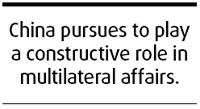China progresses on road to world peace
Updated: 2008-01-16 07:40
The conclusion in the report of the 17th National Congress of the Communist Party of China (CPC) that "the world is currently under a great transformation and adjustment" reflects the development of international strategic relations in 2007. The past year showed international relations continued to change and with some challenges, generally continued in a positive direction.

The transformation and complicated adjustments in international strategic relations is perceived as a result of the interaction of various factors such as the changing interests of countries, the rise and fall of their strengths and new policies, promoted by economic globalization and the world's multipolarization.
As for China, its relations with the big powers, neighboring countries, and developing nations have formed its overall international strategic structure.
In 2007, the international strategic structure of China continued to develop in a positive direction, demonstrated by the four "furthers": relations with big powers had been further adjusted, ties with neighboring countries had been further improved, relations with developing nations had been further strengthened, and its multilateral relations had been further developed.
The relationship with the United States was generally stable and even saw new developments. The relationship with Russia was further promoted. A benign trend toward improvement and development appeared in Sino-Japanese relations. Stability and growth were also maintained in Sino-EU ties.
The situation in countries neighboring China was generally stable. The integration process of ASEAN (Association of Southeast Asian Nations) reached a new high, and regional cooperation in South Asia was accelerated.
Relations with neighboring countries is a key factor in China's international strategic structure. In 2007, China's relations with these countries were further improved. New progress was also made in relations with North-Eastern Asian countries. In particular, progress was obtained in the Six-Party Talks on the Korean Peninsula nuclear issue.
The past year also witnessed progress in the economies of developing countries. The total economy of China, Russia, India and Brazil is now about 15 percent of the world's economy. The economies of Asia, Africa and Latin-America maintained a relatively high growth rate. The contribution to the world economy made by the new economies for the first time exceeded that of the traditional big powers.
China positively carried out comprehensive cooperation with developing countries. In 2007, the country's relationship with developing countries was further enhanced. China took the mechanism of "G8+5" as the platform to promote South-North dialogue and South-South cooperation.
Global and regional multilateral relations developed very vigorously last year. The country actively participated in multilateral affairs and played an important role in the multilateral mechanisms within the framework of the Six-Party Talks, Shanghai Cooperation Organization, ASEAN and China's "10+1" and "10+3" (ASEAN, China, Japan and South Korea), East Asia Summit, "G8+5".
Meanwhile, China attaches great importance to and actively participates in the activities of regional and international organizations like APEC and the United Nations. China views the UN as an important platform to demonstrate its image as a responsible power.
The country also attaches great importance to the safeguarding of the authority of the UN and consistently upholds that related international issues should be solved through talks within the framework of the UN.
However, China is still faced with some challenges that need to be handled properly: the international security situation is complicated and volatile and the world is not yet stable; the imbalance in the global economy is enlarged and the gap between the South and the North is growing.
Some problems still exist in China's relations with the big powers, and some complicated issues remain, in particular, the question of Taiwan.
This year, the country will implement the four "continues" proposed in the report of the 17th National Congress of the CPC, namely, continue to enhance its strategic dialogue with developed countries, continue to carry out the foreign policy of "being good to neighbors and being partners with them", continue to strengthen unity and cooperation with developing nations, and continue to actively participate in multilateral affairs by playing a constructive role.
The author is chairman of the China Institute for International Strategic Studies
(China Daily 01/16/2008 page8)
|
|
|
|
|
|